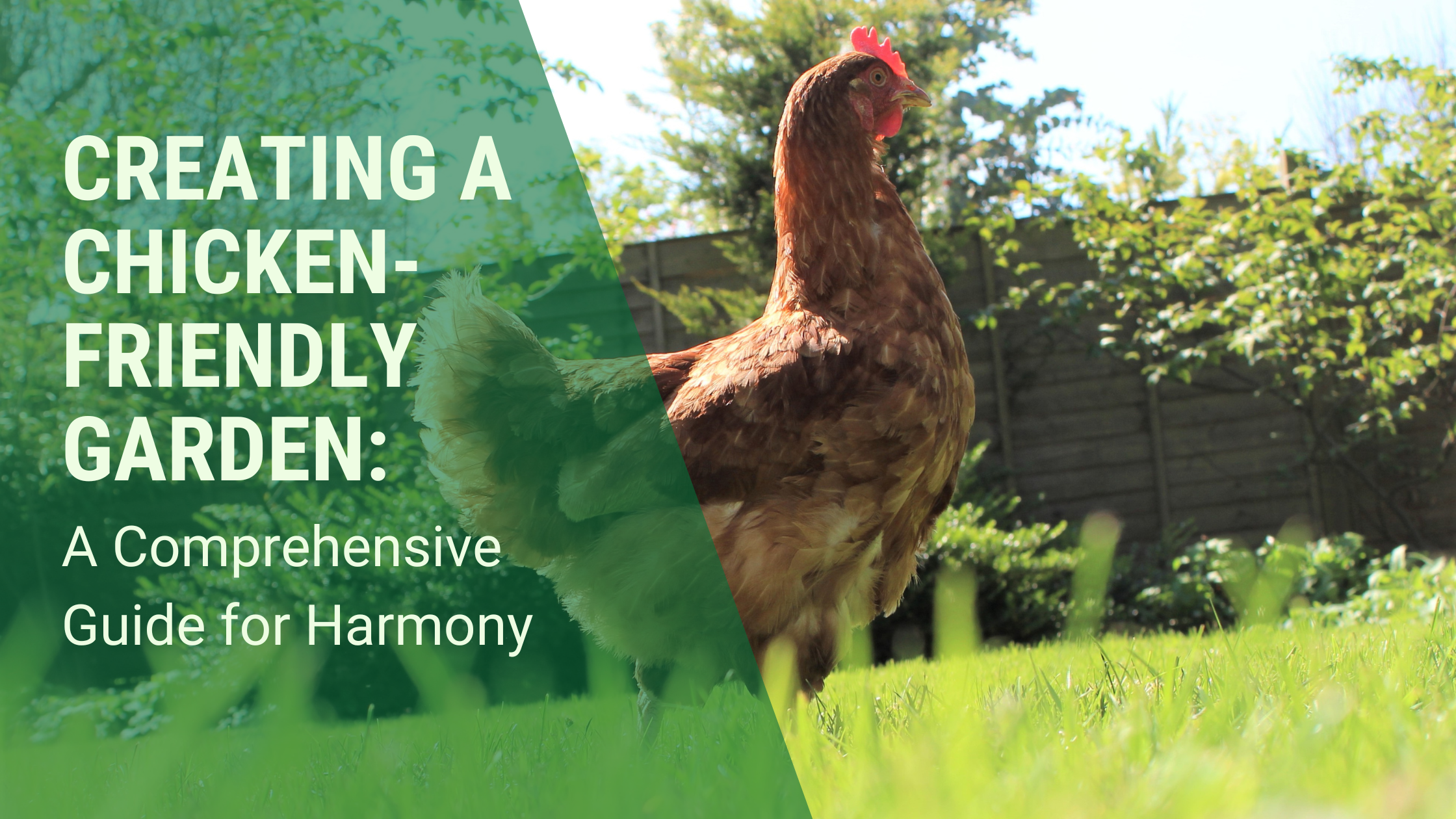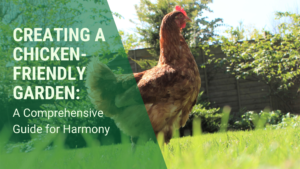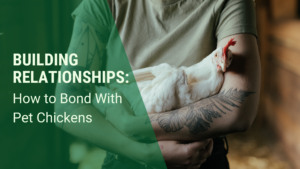- Chickens and Garden Pests: Natural Pest Control
- Creating a Safe Haven: Designing a Chicken-Friendly Garden
- Common Garden Hazards: Plants That Are Toxic to Chickens
- Feathered Friends and Foliage: Plants that are Safe for Chickens
- Beneficial Blooms: Plants that Promote Chicken Health
- Chicks and Mulch: Composting Chicken Waste in the Garden
- Eggcellent Extras: Structures and Features for a Chicken-Friendly Garden
- Creating Harmony: Balancing Chicken Needs with Garden Aesthetics
Have you ever wondered how to create a soothing haven that can benefit both you and your feathered friends? A space where chickens can roam free and nibble nutritious greens while your garden thrives on their natural behaviour? Welcome! You’re in the right place. We’re about to take you on a journey to combine the best of both worlds: a beautiful, productive garden that is also a safe and enriching environment for your chickens.
Remember, merging chickens and gardens into a symbiotic relationship is much more than saving money on eggs and pest control. It’s about crafting a sustainable system that harmoniously integrates you, your poultry, and Mother Nature herself.
This guide will unlock the secrets of designing a garden that delights your eyes and tickles the fancy of your clucking companions. A space where every shrub, leaf, and petal contributes to promoting your chickens’ health and happiness while amplifying your garden’s beauty and productivity.
We’ll delve into everything from plant selection, garden layout, and pest control to safety and enrichment ideas for your chicken-friendly garden. So, whether you’re a seasoned chicken keeper, a green-fingered garden enthusiast, or an absolute beginner, this piece will provide insights and ideas to help you create a garden that coexists in harmony with your chickens.
Let’s wander down the garden path and start building the perfect home for you and your hens.
Chickens and Garden Pests: Natural Pest Control
Chickens are natural pest controllers. Their foraging behaviour and appetite for insects can help keep your garden free from creepy crawlies and harmful pests. Say goodbye to chemical pesticides and let your feathered friends do the work! They won’t just be happy and occupied. Still, they’ll also add value to your garden ecosystem by participating in pest management.
Chickens enjoy feasting on various pests, such as aphids, slugs, and caterpillars, which can be detrimental to plants. Their sharp beaks are perfect tools for scratching in the soil and turning leaves in search of their next meal.
Turning your chickens loose in the garden, particularly between growing seasons, is like sending a team of tiny gardeners to aerate the soil, pick out pests, and fertilise the ground with their droppings. This dual-purpose gardening and chicken strategy does much more than foster a natural pest control system; it creates a symbiotic relationship between your flock and your flora, whereby one efficiently benefits the other.
Remember, a balance is essential. You want your chickens in the garden only sometimes, as they might start seeing your coveted plants as tasty treats. Set a routine for letting them out in the garden, and observe how they interact with the ecosystem. This routine can serve as both natural pest control and a way to enliven the chickens’ daily activities.
Creating a Safe Haven: Designing a Chicken-Friendly Garden

The key to a successful chicken-friendly garden is balance. It involves providing the chickens with their needs, protecting the plants, and maintaining the garden’s visual appeal. Remember that chickens won’t inherently know what to leave alone or gobble up, so it’s up to you to guide them.
Imagine your outdoor area as a shared living space when establishing your garden. Using thoughtful and creative solutions to protect tender shoots and plants is essential. A straightforward way to accomplish this is to use meshed areas, glass cloches, or even small plastic greenhouses. Protecting your greenery allows you to maintain a beautiful garden while letting your chickens roam freely.
Containers can also make a significant difference when designing your chicken-friendly garden. Vibrant, creative containers and elevated plantings can discourage chickens from uprooting the plants and contribute positively to the overall aesthetic of your garden. Likewise, these can also act as additional perching areas for your chickens, enhancing their garden experience.
To ensure your garden continues flourishing, it’s best to start with a few plants and observe how your chickens interact with them. Local garden centres and nurseries are excellent sources of information about plants that thrive in your garden and soil conditions. Focusing on durable, hardy varieties can be a good strategy. Their resilience in various situations and low maintenance needs make them ideal for a chicken-friendly garden.
Remember that chicken-friendly gardening involves some trial and error. Some plants will thrive, whilst others might fall victim to your feathered friends’ pecking. Be patient and flexible in your approach. Experiment with different plant types and note what works best for your chickens and your garden.
Space requirements for free-range chickens are vital when considering their welfare and happiness. Too few spaces can lead to over-foraging and unpleasant odours. Allowing your chickens to roam in the garden between growing seasons can provide them with engaging foraging opportunities while performing useful chores for you, such as turning leftovers into energy and compost for the garden.
Designing a chicken-friendly garden doesn’t mean sacrificing beauty or functionality. With a bit of thought, creativity, and understanding of both chickens’ needs and plant requirements, you can create a garden that pleases both you and your chickens.
Common Garden Hazards: Plants That Are Toxic to Chickens
While chickens may lack the knowledge to distinguish harmless nourishment from hazardous nibbles, plant poisonings amongst backyard chicken flocks are, fortunately, relatively rare. Regardless, an ounce of prevention is worth a pound of cure, so it’s still crucial to know what landscape elements could potentially pose a danger to your flock.
Poisonous plants may vary depending on the region and climate, but there are some universal plants to avoid.
| Plant Name | Why is it Harmful | Symptoms in Chickens |
|---|---|---|
| Foxglove (Digitalis) | Contains cardiac glycosides that affect the heart | Vomiting, diarrhoea, heart failure |
| Rhubarb Leaves | High concentrations of oxalic acid | Difficulty breathing, tremors, convulsions |
| Azalea | Grayanotoxins that affect the nervous system | Weakness, difficulty breathing, trembling |
| Hemlock | Neurotoxins that can paralyse | Weakness, tremors, eventual paralysis |
| Wild Cherry | Contains cyanogenic glycosides that break down into cyanide | Anxiety, gasping, convulsions, death |
Feathered Friends and Foliage: Plants that are Safe for Chickens
| Common Name | Scientific Name |
|---|---|
| Dandelion | Taraxacum officinale |
| Comfrey | Symphytum |
| Hardy Geraniums | Geranium bohemicum |
| Hardy Fuschias | Fuchsia magellanica |
| Oriental Grasses – various | Carex sp., cortaderia selloana, festuca ovina, imperata cylindrica, miscanthus senensis etc |
| Marigold | Tagetes |
| Aster | Aster |
| Sunflower | Helianthus |
| Marjoram | Origanum majorana |
| Nasturtium | Tropaeolum |
| Honeysuckle | Lonicera |
| Jasmine | Jasminum officinale |
| Primroses | Primula vulgaris |
| Rose Varieties | Rosa |
| Lupins | Lupinus |
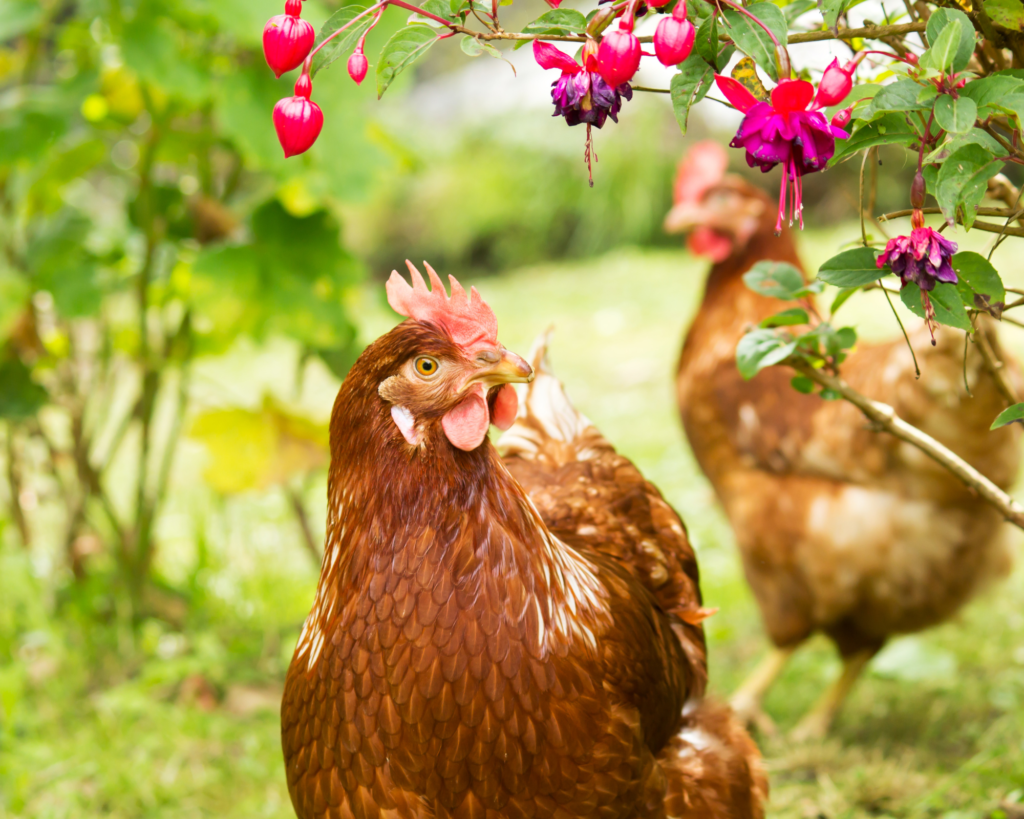
Beneficial Blooms: Plants that Promote Chicken Health
| Plant Name | Benefit to Chickens |
|---|---|
| Mint | Insect repelling, digestion aid, and respiratory health |
| Marigold | Boosts skin health, strengthens immune system, and natural worming agent |
| Garlic | Promotes overall health due to antibacterial properties |
| Rosemary | Respiratory health, insect deterrent, and a stress reliever |
| Lavender | Calming, natural worming agent, and aids skin health. |
| Sage | Contains antioxidants and can help combat salmonella. |
| Calendula | High in oleanolic acid, great for anti-bacterial and antioxidant qualities. |
| Catnip | Not only brilliant for your furrry companions, it’s also known to chill out our feathered friends! |
| Thyme | Helps respiratory health, anti-parasitic, and boosts immune system |
Chicks and Mulch: Composting Chicken Waste in the Garden
Let’s talk rubbish – or rather, talk about transforming your chicken’s waste into a nutritious compost for your garden. Chickens are marvellously efficient machines that can turn garden waste into a fertile, nutrient-rich compost, essentially turning trash into treasure – just like we do with our Black Soldier Fly larvae and brewery waste!
Your bird’s droppings are rich in nitrogen, phosphorus and potassium, which are vital for plant growth. Healthy chicken manure compost is safe for plants, making it a fantastic and sustainable fertiliser. Moreover, letting your chickens roam the garden during growing off-seasons allows them to contribute to various garden chores, including turning the soil and helping to break down compost material.
To make fantastic compost using chicken waste, start by collecting the droppings regularly from the chicken coop. Mix the droppings with other organic matter like grass clippings, dead leaves, food scraps or paper. This balanced compost pile encourages beneficial microbes that hasten the composting process.
Composting can also help eliminate foul odours often associated with chicken waste. The right balance of ingredients in your compost pile and regular turning fosters the ideal conditions for composting, where odours are minimal. This is a win-win, making your garden healthier and maintaining a pleasant environment.
Remember to let your compost mature before using it. Fresh chicken manure is high in ammonia, which can burn plants if applied directly. Chicken waste typically takes around 6-9 months to turn into compost. However, once it’s ready, you’ll have a wonderfully rich, crumbly compost that your plants will love.
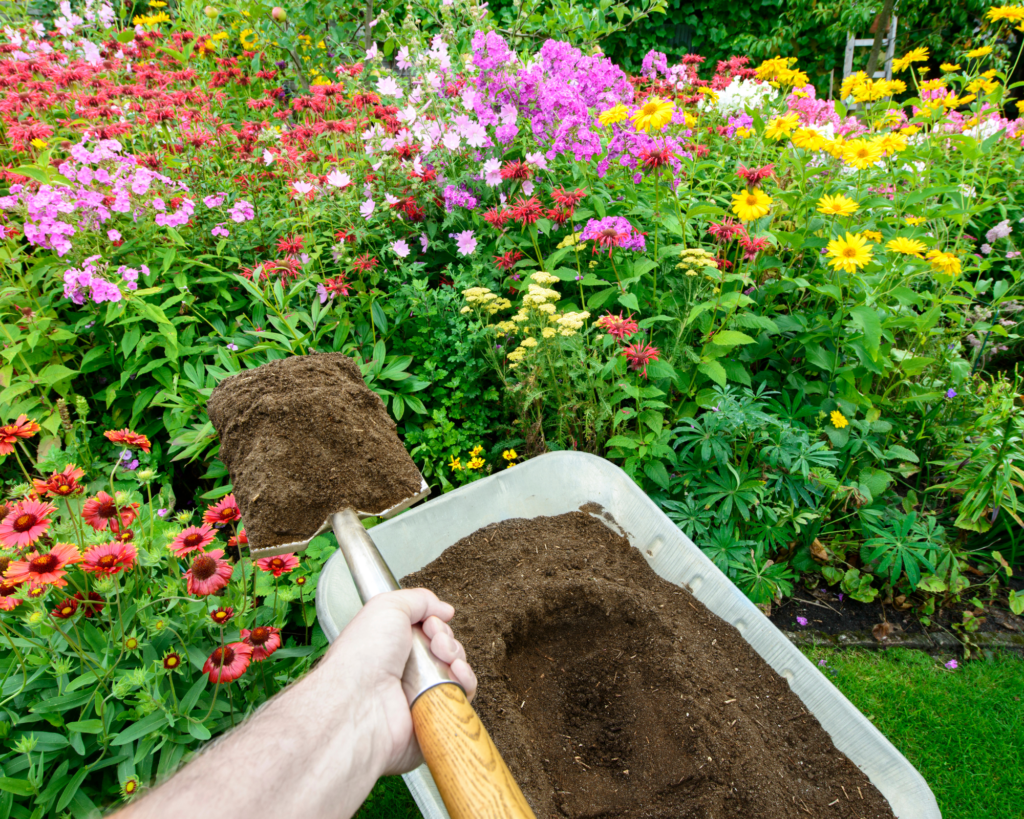
To summarise, composting chicken waste not only aids in waste disposal and garden upkeep but also provides an excellent natural fertiliser. By orchestrating this symphony of recycling, you’ll be singing the praises of your garden’s transformation and your chickens’ industrious contributions!
Eggcellent Extras: Structures and Features for a Chicken-Friendly Garden

Creating an environment that accommodates chickens and your garden aspirations is a careful balancing act. You must provide your chickens adequate space foraging without leaving your garden bereft. To minimise the risk of over-foraging and avoid unpleasant odours, it’s essential to have proper spacing for your free-range chickens. A good rule of thumb is to allow at least 10 square feet per chicken. This would mean that for a small flock of six chickens, you would need a minimum space of 60 square feet, which is roughly a 7.5-foot square patch of ground.
Another critical aspect is protecting the young tender plants from your chickens’ enthusiasm. There are several ways to shield them: use meshed areas, glass cloches, or plastic greenhouses. This not only discourages unwanted pecking but also allows your plants to grow strong and reside harmoniously with the chickens.
Using creative containers for your plantings could also be an innovative way to deter your birds from uprooting your plants. An old log, a tall, sturdy planter, cloches, and netting can help keep your chickens where they’re welcome (and vice versa)! The sky’s the limit when it comes to inventiveness. Elevated plantings create difficulties for your chickens to create mayhem and help to save any potential plant casualties.
Creating Harmony: Balancing Chicken Needs with Garden Aesthetics

Every passionate poultry keeper and garden aficionado dreams of finding the perfect balance between maintaining a flourishing garden and providing an incredible habitat for poultry. It’s important to remember that creating this equilibrium isn’t impossible but rather a matter of strategic planning and creativity. Think of your garden and chicken needs as a beautiful dance of interdependence, where one dramatically benefits from the other.
Local garden centres offer an array of plants that perform exceptionally well even when they have to contend with chickens as garden companions! Ornamental grasses are a fantastic starting point. They are robust, capable of thriving in varying conditions, essentially chicken-proof, and require minimal nurturing. Fruits and vegetables, particularly those producing leafy greens and berries, are a hit amongst chickens. They provide a nutritious snack for chickens and humans alike.
Additionally, steer clear from planting with substances such as perlite and vermiculite. While harmless to humans, they pique the curiosity of chickens, which may lead them to dig up and displace your plants. Instead, cover such soils with mulch, vermiculite-free soil, leaves, or rocks to dissuade any potential disturbances caused by your feathered friends.
Bear in mind, though, that any gardening methodology you adopt is subject to the whims of your individual chickens. You could soon find your carefully laid plans uprooted—quite literally. Therefore, remain flexible and always ready to employ creative solutions like adding deterrent elements.
Follow us on social media for more tips and tricks.

